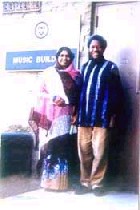Fusion
WORLD MUSIC
UNDERSTANDING WORLD MUSIC
The discipline Ethnomusicology branched out of musicology because of the ardent desire of many Western musicologists to study non-western music that had passed on from generation to generation through the oral tradition, especially the music of tribal and village communities.

After World War II, many musicologists did not favour the term Comparative
Musicology and one of them was Jaap Kunst, the Dutch Ethnomusicologist who argued that the
term was not entirely satisfactory. However the comparative method is frequently used in
other fields of musicology and studies in this field are often not directly comparative.
Therefore Jaap Kunst introduced the term Ethnomusicology in his little booklet Musicologa
in the title page of the book in 1950. He placed the prefix “Ethno” in front of
the word Musicology with a hyphen to indicate that the study would be on the music of the
races of man or ethnic groups.
The term was virtually accepted immediately and a Society for Ethnomusicology was
established in 1956 in the United States of America. The members who formed the society
discussed and favoured the view that, “Ethnomusicology is by no means limited to the
so-called ‘primitive music’ and is defined more by the orientation of the
student than by any rigid boundaries of discourse”. The term Ethnomusicology is more
accurate and descriptive of this discipline and its field of investigation than the older
term, Comparative musicology. The hyphen in Ethnomusicology was officially dropped by the
Society for Ethnomusicology in 1957. Prof. David McAllester one of the founders of the
Society, emphasized that this new discipline must not be defined by the music under study,
but by its methodology.
By late 1950s, the term Ethnomusicology came into use with or without hyphen as synonyms
and by the end of the decade, the term comparative musicology acquired a historic status.
Many Ethnomusicologists from time-to-time have defined the term Ethnomusicology, thus
changing the connotations of the term. Jaap Kunst defined the term Ethnomusicology as
“the study of the music and musical instruments of all non-European peoples,
including both the so-called primitive peoples and the civilized Eastern nations”. In
the third edition of this same book, he wrote that it is a study of “Traditional
music and musical instruments of all cultural strata of mankind” but specifically
named “tribal and folk music and every kind of non-western Art-music” but
specifically excluding Western Art and popular music. The definition was satisfactory at
that period for many Ethnomusicologists. More definitions for the term Ethnomusicology
began to come up from 1960s from various Ethnomusicologists extending the scope of study
wider and wider.
Dr. S A K Durga